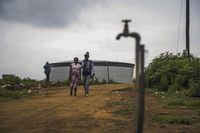In a year marked by economic uncertainty and political turmoil, South Africa's markets are facing significant challenges stemming from both global factors and domestic policies. According to Sanisha Packirisamy, an economist at Momentum Investments, while risks have improved compared to last year, the sentiment within the country has taken a noticeable hit in 2025. This downturn is largely attributed to the return of US President Donald Trump and his controversial global trade policies.
On April 5, 2025, Trump initiated a universal 10% tariff on imports, followed by reciprocal tariffs affecting approximately 60 countries starting on April 9. Although the latter tariffs were paused for 90 days, the overarching 10% global tariff remained in effect, exacerbating already heightened trade tensions with China. Packirisamy noted that the ramifications of Trump's foreign policy actions have negatively impacted South Africa, which has faced direct political targeting and economic repercussions from these tariffs.
As a result, South Africa's GDP growth projections for the year have been adversely affected, with market uncertainty also impacting the value of the rand. However, despite these challenges, the risk premium associated with South Africa has decreased compared to the previous year, driven by market optimism regarding potential policy reform under the Government of National Unity (GNU). This coalition government was formed after the ANC lost its parliamentary majority in the May 2024 elections.
Packirisamy explained that while some of the decline in risk premium has reversed due to slow reform momentum and rising global geopolitical risks, the current risk premium remains well below pre-election levels. "Although some of the risk premium decline has reversed in recent months due to slow reform momentum and a rise in global geopolitical risk, the current risk premium is still well below pre-election levels and roughly in line with the 10-year average," she stated.
In addition to the geopolitical pressures, South Africa is grappling with a looming increase in value-added tax (VAT), set to take effect in May 2025. This decision has sparked significant debate, with critics arguing that the VAT hike disproportionately affects low-income households already struggling with inflation and economic exclusion. Delwyn Verasamy, writing for M&G, highlighted that VAT is inherently regressive, taking a larger percentage of income from the poor than the wealthy.
The National Poverty Lines (NPLs) for 2024 indicate just how precarious the situation is for many South Africans: the Food Poverty Line (FPL) stands at R796, the Lower-Bound Poverty Line (LBPL) at R1,109, and the Upper-Bound Poverty Line (UBPL) at R1,634 per month. With more than 28 million people relying on some form of social assistance, even a marginal increase in VAT can push households deeper into poverty.
According to the World Bank's Macro Poverty Outlook for South Africa, the country is facing a staggering unemployment rate of 32.4%, with public debt rising to 74.1% of GDP, up from 38.2% in 2008. Real income per capita has regressed to 2007 levels, and average annual GDP growth from 2014 to 2023 was a mere 0.8%. These figures underscore the dire economic landscape in which the VAT increase is being introduced.
In light of the significant backlash against the VAT proposal, the ANC appears to be reconsidering its stance. Reports from the Sunday Times indicate that the party is likely to abandon its plan for a 0.5 percentage point VAT increase after discussions with various political parties revealed a lack of support. The coalition government, formed after the ANC's electoral losses, has faced internal tensions, particularly with the Democratic Alliance (DA), which has voted against key budget legislation.
Despite the challenges, Packirisamy noted some positive developments for South Africa, particularly in the realm of gold prices. The global demand for gold, driven by central bank purchases since the onset of the Russia-Ukraine war in February 2022, has bolstered the US dollar price of gold. This trend has been beneficial for South Africa, where the rand gold price has consistently performed well among local asset classes over the past 50 years.
Packirisamy remarked, "As gold does not rely on any issuer or government, it enables central banks to diversify their reserves away from assets like US Treasuries and the dollar." This diversification is crucial as it allows countries, including South Africa, to stabilize their economies amidst global uncertainties.
Looking ahead, there are calls for a more equitable tax system that could alleviate some of the financial pressures on lower-income citizens. Suggestions include implementing a progressive capital gains tax, increasing estate taxes on large inheritances, and introducing taxes on vacant properties to discourage land hoarding. Such reforms could address the deep-seated inequalities highlighted by South Africa's Gini index of 63.0, which reflects stark disparities in income and opportunity.
Moreover, there is a growing consensus that South Africa needs to invest in infrastructure and support small businesses to stimulate economic growth. Recommendations include establishing a government-backed innovation fund focused on high-impact industries and expanding digital services to enhance the country's competitiveness. These strategies aim to create jobs and foster economic resilience without further burdening households with increased taxes.
In conclusion, South Africa stands at a crossroads, facing both significant challenges and potential opportunities for reform. The interplay of domestic policies, global economic pressures, and the urgent need to address inequality will shape the nation's path forward. As the government navigates these turbulent waters, the voices of its citizens will be crucial in determining the future of the country's economic landscape.





